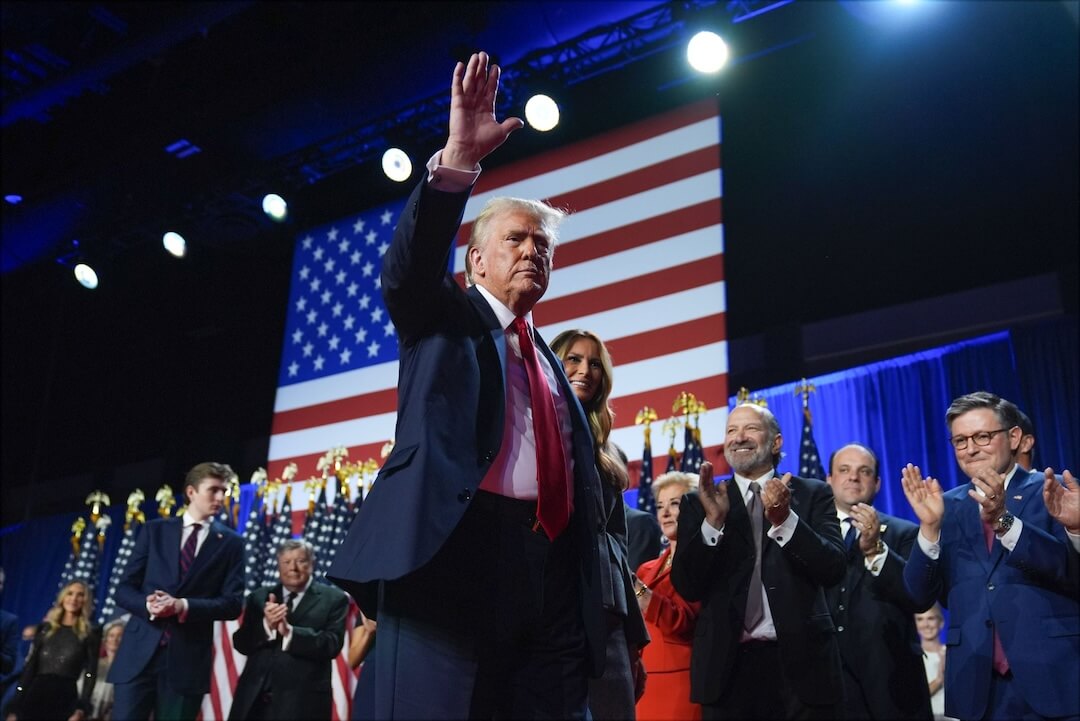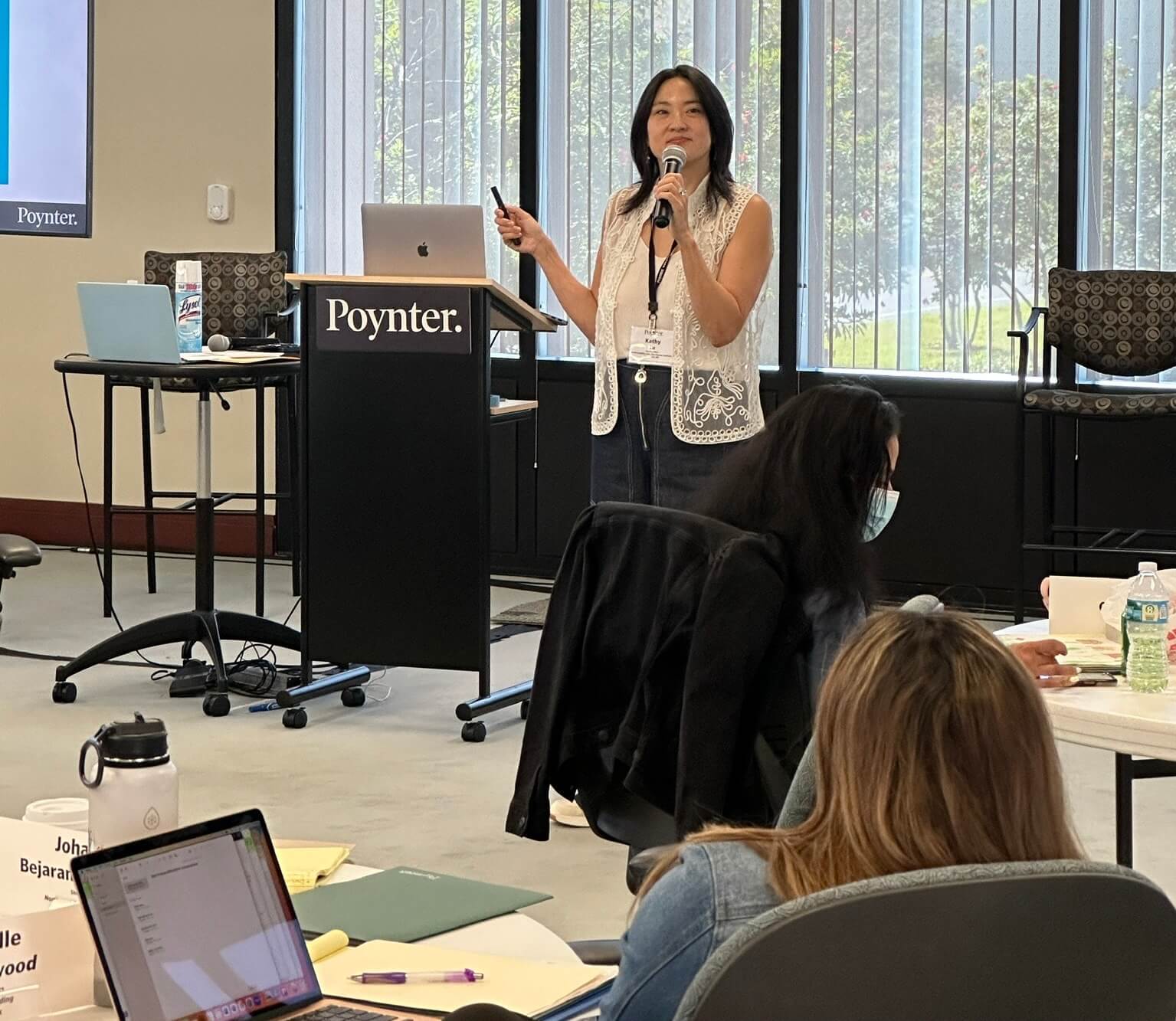When called out for flip-flopping on his stances, Republican presidential candidate Vivek Ramaswamy usually characterizes the instances as “opposition research” or false.
One example: During the Aug. 23 Republican candidate debate, Chris Christie accused Ramaswamy of changing his position about former President Donald Trump.
“In your book, you had much different things to say about Donald Trump than you’re saying here tonight,” said Christie, the former New Jersey governor.
Ramaswamy replied: “That’s not true.”
Trump is just one of many topics that social media users or the media have said Ramaswamy has changed in how he described his position. And we found several examples of Ramaswamy changing his talking points.
PolitiFact routinely examines whether candidates and elected officials have flip-flopped on their positions. We contacted Ramaswamy’s spokesperson seeking clarity on his positions and did not receive a response by our deadline.
His stance on former Vice President Mike Pence’s actions Jan. 6, 2021
Ramaswamy went from lauding Mike Pence’s actions on Jan. 6 to saying that Pence had missed an opportunity.
“Mike Pence, a man I have great respect for, decided it was his constitutional duty to resist the president’s attempts to get him to unilaterally overturn the results of the election, even in the face of the January 6 Capitol riot,” Ramaswamy wrote in “Nation of Victims,” his 2022 book. “Our institutions did hold, in the end. But they shouldn’t have been tested. … The fact that all of our governmental institutions so unanimously found no evidence of significant fraud is telling.”
But on Aug. 27 on NBC’s “Meet the Press,” Ramaswamy said, “There was a historic opportunity that (Pence) missed to reunite this country in that window.”
Ramaswamy then said if he’d been in Pence’s position, he would have advocated for single-day voting on Election Day, paper ballots and government-issued IDs at polling places.
“I would have led through that level of reform, then, on that condition, certified the election results, served it up to the president — President Trump then — to sign that into law,” Ramaswamy said.
Trump’s 2020 election loss and Jan. 6
Ramaswamy criticized Trump’s actions in the aftermath of the 2020 election, but during the 2024 campaign, he has praised the GOP frontrunner.
One week after Jan. 6, 2021, Ramaswamy wrote on X, “What Trump did last week was wrong. Downright abhorrent. Plain and simple.”
In his 2022 book, Ramaswamy also wrote that he voted for Trump in 2020, but that Trump delivered “another tale of grievance” and “no one likes a sore loser; that’s one of the worst victimhood complexes of all.” He called Trump’s claims about the election “weak.”
Ramaswamy did not criticize only Trump. Days after Jan. 6 he wrote a Wall Street Journal editorial critical of social media companies’ actions during the election.
Now, during the 2024 campaign, Ramaswamy has pivoted to praising Trump, calling him the “best president of the 21st century.” Ramaswamy promised that if he is elected, he will pardon Trump if he is convicted.
Ramaswamy does not mimic Trump’s debunked statements about a “stolen” election. Ramaswamy said Aug. 27 on “Meet the Press,” “I have not yet seen evidence that there was ballot fraud of a scale that would have changed that result.”
Pardoning Hunter Biden
Ramaswamy initially said he would be open to considering pardons for the “Biden family,” but later said he wouldn’t pardon the president’s son, Hunter Biden.
The New York Post wrote in August that Ramaswamy said, “After we have shut down the FBI, after we have refurbished the Department of Justice, after we have systematically pardoned anyone who was a victim of a (politically) motivated persecution — from Donald Trump and peaceful January 6 protests — then … I would be open to evaluating pardons for members of the Biden family in the interest of moving the nation forward.”
But on X the next day, Ramaswamy wrote, “No, I don’t have any plans to pardon Hunter Biden. It’s planted trash. When you strike the swamp, the swamp strikes back.”
He told Fox News’ Maria Bartiromo that he was misquoted and that it was “purposeful opposition research.”
Hunter Biden was charged in September for lying on a federal gun form about his drug use and remains under investigation for tax evasion.
TikTok
Ramaswamy criticized TikTok and then created an account on the platform.
“I am very open to banning TikTok outright,” he wrote on X in February. “In the meantime, we sit on our hands and do nothing as kids get addicted to it like it’s digital fentanyl.”
Later, on Sept. 13, Ramaswamy announced that he was joining TikTok. “Yes, kids under age 16 shouldn’t be using it, but the fact is that many young voters are & we’re not going to change this country without winning,” he wrote on X. “We can’t just talk about the importance of the GOP ‘reaching young voters’ while hiding in our own echo chambers.”
Ramaswamy is not the first candidate to criticize a social media platform while simultaneously using it. Sen. Elizabeth Warren, D-Mass., advertised on Facebook while also saying that big tech had too much power.
U.S. funding for Israel
Ramaswamy has shifted the way he talks about future U.S. aid to Israel.
In June, he showed an openness to cutting off aid as part of a broader strategy, but after facing criticism for his remarks throughout the summer, he tacked on major caveats.
The Washington Free Beacon, a conservative news outlet, published in June a two-minute clip of a person asking Ramaswamy whether he would end aid to Israel gradually, pushing for a yes or no answer.
“It would have to be part of a broader disengagement with the Middle East so I would not do that as an isolated policy,” Ramaswamy said in the footage. “I would do it as part of also making sure that we’re not leaving other people we’ve also propped up, from Saudi Arabia to even Iran, in other ways over the years. So it has to be part of a comprehensive strategy.”
Ramaswamy told the Free Beacon that he was not expressing support for cutting funding for Israel. He said he was “opposed to selectively criticizing U.S. aid to Israel. That was my point.”
He has since given a more detailed answer.
In an Aug. 11 interview with actor Russell Brand, Ramaswamy said, “I believe in standing by commitments that we’ve already made.” He referred to the 2016 agreement for the U.S. to provide Israel with $38 billion in military aid from 2019 through 2028.
But Ramaswamy said he wants to negotiate “Abraham Accords 2.0” with Saudi Arabia, Oman, Qatar and Indonesia to “get Israel on its own two feet.” The Abraham Accords in 2020 normalized diplomatic relations among Israel, the United Arab Emirates, Bahrain and Morocco.
“Come 2028, that additional aid won’t be necessary in order to still have the kind of stability that we would actually have in the Middle East by having Israel more integrated in with its partners,” Ramaswamy said. “Then it puts us in a position, everybody’s position, to say we don’t have to meddle.”
On Aug. 18, Ramaswamy posted on X, “We will not leave Israel hanging out to dry — ever.”
After fellow GOP presidential candidate Nikki Haley said he wants to defund Israel, Ramaswamy’s campaign website posted under a URL titled “fake news,” “Most importantly, he won’t cut aid to Israel until Israel tells the U.S. that it no longer needs the aid.” It also said, “That’s what Vivek actually said, so don’t believe the opponents’ lies that he wants to cut aid to Israel – which makes zero sense as a foreign policy priority any time in the foreseeable future.”
Whether the U.S. will defend Taiwan
Ramaswamy initially suggested he would allow the U.S. to protect Taiwan until 2028 with conditions, but later softened his stance.
In an Aug. 14 interview with conservative radio show host Hugh Hewitt, Ramaswamy said: “Do not mess with Taiwan before 2028, before the end of my first term, okay?” He added “that commitment is only as far as 2028, by which point I will have led the United States of America to achieve semiconductor independence, and we will not take the risk of war that risks Americans lives after that for some nationalistic dispute between China and Taiwan.”
Taiwan produces about 60% of the world’s semiconductors, which are commonly known as chips and are used in devices including computers and smartphones.
He made similar comments Aug. 19 at conservative radio host Erick Erickson’s Atlanta conference.
In late August, Ramaswamy backpedaled, telling Fox News’ Sean Hannity, “We have to defend Taiwan until we achieve semiconductor independence, at which point we resume our current posture of strategic ambiguity.” The term “strategic ambiguity” means it’s unclear to what extent the U.S. would defend Taiwan if it was attacked.
Hannity followed up, saying, “As long as Taiwan provides semiconductor chips we will help them, but after that they are on their own?”
Ramaswamy replied: “No, that’s again how my position has been caricatured.” He added that the U.S. “will defend Taiwan” and again said he would “resume the current position of the United States after we’ve achieved semiconductor independence.”
Decriminalization of drugs
He has shown some support for decriminalizing drugs, but generally has distinguished between fentanyl and other drugs.
“You don’t hear me talk about the war on drugs. I’m not a war on drugs person,” Ramaswamy said in New Hampshire in June.
“I’m probably the only person in the modern history of our party that is open to a conversation,” he said, mentioning veterans, post-traumatic stress disorder and psychedelic drugs such as ayahuasca and ketamine.
He also said that “in the long run, and I’m talking about over a long run period of time, decriminalization, serially, is an important part of the long-run solution here.”
But he repeatedly expressed alarm about the fentanyl crisis, citing the flow of drugs from China and Mexico and calling for sealing the southern U.S. border with Mexico.
After Fox News published a headline that quoted Ramaswamy saying, “‘I’m in that direction,'” with regard to decriminalization, he replied with a post on X.
“More planted trash. I support decriminalizing ayahuasca & ketamine for veterans suffering from PTSD, to prevent the epidemic of fentanyl & suicide,” he wrote. “It’s pathetic that Establishment candidates are using lies as a substitute for a message.” He then repeated an earlier comment he’d made about the New York Post’s coverage: “When you strike the swamp, the swamp strikes back.”
Researcher Caryn Baird contributed to this report.
This fact check was originally published by PolitiFact, which is part of the Poynter Institute. See the sources for this fact check here.







